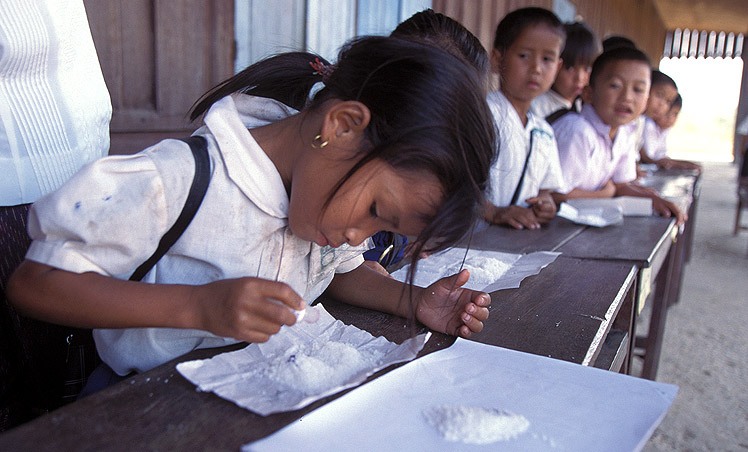Iodine Global Network (IGN)
Sprunglinks/Accesskeys
Zur Startseite (Accesskey 0) Direkt zur Hauptnavigation (Accesskey 1) Direkt zum Inhalt (Accesskey 2) Kontakt (Accesskey 3) Sitemap (Accesskey 4) Suche (Accesskey 5)
DONATE

On Giving Tuesday, thank you to our donors
November 2021

In a small school, children in Laos have brought their household salt samples to test for iodine content. This helps raise awareness of the problem and the importance of using iodized salt. Photo credit: UNICEF
Salt iodization has changed the world for the better. The simple process of adding tiny amounts of iodine to salt for human and animal consumption is protecting hundreds of millions of people from brain impairment due to iodine deficiency.
Nowadays we seldom see the more severe effects of iodine deficiency – goitres and more devastating conditions such as cretinism - that were once common. Even mild deficiency is less of a problem in many countries, helping children to learn and contribute fully to the economic development of their communities and nations.
Many people and organizations have contributed to this success. Not only governments and industry, but also civil society organizations, who raised awareness and funding for iodization programs. Kiwanis International, for example, provided early, steadfast and significant support and still does today.
But out of sight can mean out of mind, and in a world of competing priorities, it’s more important than ever to ensure that salt iodizaton is sustained and that we don’t undo the progress we have made.
We want to thank all our donors for their continued support for a world free of iodine deficiency, and to let you know that we use your contribution wisely. We don’t have physical offices, so our administrative costs are low. We are a tightly knit team of dedicated professionals who want to make a difference. You help us to do that every day, allowing us to to remain watchful to ensure salt is iodized for ever, and to reach countries, regions and communities that are still affected.
When you donate to us, whether through a donor platform such as The Life You Can Save or GiveWell, or through organizations such as Founders Pledge, Effective Altruism, Kiwanis International or the Giselle Foundation, you’re putting your faith in something intangible. But even small amounts make a difference, and there are many real successes to share:
Nowadays we seldom see the more severe effects of iodine deficiency – goitres and more devastating conditions such as cretinism - that were once common. Even mild deficiency is less of a problem in many countries, helping children to learn and contribute fully to the economic development of their communities and nations.
Many people and organizations have contributed to this success. Not only governments and industry, but also civil society organizations, who raised awareness and funding for iodization programs. Kiwanis International, for example, provided early, steadfast and significant support and still does today.
But out of sight can mean out of mind, and in a world of competing priorities, it’s more important than ever to ensure that salt iodizaton is sustained and that we don’t undo the progress we have made.
We want to thank all our donors for their continued support for a world free of iodine deficiency, and to let you know that we use your contribution wisely. We don’t have physical offices, so our administrative costs are low. We are a tightly knit team of dedicated professionals who want to make a difference. You help us to do that every day, allowing us to to remain watchful to ensure salt is iodized for ever, and to reach countries, regions and communities that are still affected.
When you donate to us, whether through a donor platform such as The Life You Can Save or GiveWell, or through organizations such as Founders Pledge, Effective Altruism, Kiwanis International or the Giselle Foundation, you’re putting your faith in something intangible. But even small amounts make a difference, and there are many real successes to share:
|
We are very grateful to you all.
Werner Schultink
Executive Director, and the IGN team
Werner Schultink
Executive Director, and the IGN team